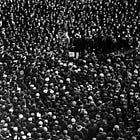"The News" Makes You Vulnerable to Propaganda
The news isn't what you think it is. It is more than just reporting. Its more than just a vehicle for propaganda. The news creates the conditions that make you vulnerable to manipulation.
We are so used to the idea today that the news is biased, that the vast majority of reporters are not merely left leaning, but are actively an apparatus of the regime. We might even go so far as to say that the state itself is driven and controlled by the media. We talk about lies and distortions. There are those who believe in a kind of golden period of media neutrality, or near neutrality, where reporters stove to give just the facts, relaying the events to the reader, listener or watcher in a way where their own personal biases did not influence how the story was reported. There was supposed to be a clear boundary between “news” and “opinion.” What most people don’t realize is that while bias is a problem, one that cannot be gotten rid of or worked around, the real problem with “the news” is the news itself.
To get at this, we have to bore down into “the news” as a medium irrespective of its content. Ellul wants us to think about propaganda like the ocean with all of its currents. Pre-propaganda, that is, the general context of propaganda, the constant myth making and story shaping that we talked about last time, think of that as the greater ocean currents. When a man sees the ocean, though, he does not really see all of those great currents. What he sees is the surface phenomenon, the waves. The waves only exist because of the greater currents moving beneath the water, driving them to the shores. It is through his perception of the waves that he relates to the grandeur of the ocean. Propaganda, argues Ellul, needs both the excitability of the wave with the mass of the ocean driving it. The news is in the wave. The news is surface phenomenon. Man is caught up in the waves, but he is unaware of being driven by the deep ocean currents.
What the news does, is it breaks down continuity within a person. It need not be as intense as the non-stop 24 hour news cycle. The daily, or even the weekly catching up on “current events” is enough for the news to have its effects on a person. Only so many things can command our attention. This is also the danger of social media. Ellul puts it this way:
“Neither past events nor great metaphysical problems challenge the average individual, the ordinary man of our times. He is not sensitive to what is tragic in life; he is not anguished by a question that God might put to him; he does not feel challenged except by current events, political or economic.”
One should add to this list more vacuous pursuits like following entertainment news, the drama of artists, musicians and actors; or sports news, the relentless focus on the latest scores, team news, injury reports or fantasy league updates. Even though driven by the deeper currents of pre-propaganda, propaganda really begins with the news, with current events. The idea is to get the public trained to be sensitive to the latest events, to want to be constantly catching up on the current thing that is in the news.
What the news does is that it creates a perpetual present. Stories cross in and out of one’s attention. Before this item of news is digested, it is pushed aside by some new event. Your mind never has time to rest, to process this constant stream of reports and integrate them into a larger cohesive whole, to give them shape or meaning. They just come, one after the other, in a constant stream. Even when watching a news broadcast now, you can have multiple streams bombarding you at once. Traffic reports, weather, sports, news ticker, plus a talking head reading a story. All at once. All on the same screen.
Whether it is a newspaper, the radio, the television, your Facebook or Twitter feed, the effect is similar.
“It cannot permit time for thought or reflection. A man caught up in the news must remain on the surface of events; he is carried along in the current…there is never any awareness — of himself, of his condition, of his society — for the man who lives by current events.”
He who follows the news is riding the wave and is being driven by the current.
“One thought drives away another; old facts are chased away by new ones. Under these conditions there is no thought. In fact, modern man does not think about problems, he feels them.”
There is immense social pressure to always be up on the latest news, whether that is in politics, sports or entertainment, whatever is valued by one’s social circles. This is itself an expression of the mythic structure of western society that we discussed in the last piece. History is supposed to unfold in endless progress. This sets up a society wide attention bias upon what is new as opposed to what is old. There is a hunger for what is new and novel. The traditional, the old is forgotten. One of the functions of the news is that is destroys our connection with the past, with tradition, with that which has been passed onto us. Why tell the old stories again when there is the news demanding your attention. And so, you now just float, bobbing and weaving, driven by a constant stream of news. You have forgotten the past and there is no future, there is just the present moment, happening now, that demands attention now. A man such as this is no longer grounded in anything. He has no continuity of existence. There is nothing to anchor him. He is now the ready target for propaganda. In this environment the idea of an objective reality or that truth is anchored in facts is meaningless.
“What makes it news is its dissemination, not its objective reality.”
With this in mind, Ellul introduces us to the Undecided. He argues that this is a far larger group than most give credit. Basically, it includes anyone who does not have enough information of actually what is going on or the expertise or experience to evaluate events and formulate their own opinions as to what is actually happening and what can be done about it. If you are reliant upon the news for much of your information and opinions, you are technically part of the “Undecided.”
“The Undecided, far from being outside the group, are participants in the life of the group, but do not know what decision to make on problems that seem urgent to them. They are susceptible to the control of public opinion, and the role of propaganda is to bring them under control, transform their potential into real effect.”
The reason why many of us think of ourselves as outside of the Undecided is that more often than not that we have already accepted the answers given to us by propaganda. Most of us have opinions on issues we know little about, but we are very sure of them. More often than not we are part of the mass of the Undecided who have already been successfully propagandized. The Undecided are often those most intensely involved in the social currents. This is the power of social media, to keep us constantly plugged into these currents. What “the news” demands is your attention. Remember, it works on the “person-in-crowd.” So it is reaching you as a person, but not with something that is of unique interest to you, but rather with things that are of interest to the masses.
This is why religious propaganda is not very effective. Society as a whole is not interested in religious problems. And if they are interested in religion, they are interested in it only so far as it has been filtered through mass, modern, technological society. People are not interested in repentance, in personal sacrifice, in moral virtue, in prayer and contemplation. They are interested in how Christian teaching can be used as a political program or a set of policies that can be turned into a platform. They are interested in it as a program for achieving happiness. But they are not generally interested in religious problems as religious problems. They are interested in technology and systems. They are interested in economics and politics. The Christian faith gets transmuted and becomes useful to people insofar as it is able to adapt to the current political, economic and social climate.
It is important to really see this change. Today, politics is a central focus of our lives. It was not this way in the 12th century. The church played a central role in the lives of people. When a man entered the church, especially if that church was a cathedral, he stepped into a theocratic space meant to overwhelm the worshiper with its majesty, an instantiation of the hierarchy of being in architecture. The priest was a central figure in the community. The rhythm of life was governed by Christian feast days and the sacred calendar. People were much more mindful on the whole about their spiritual condition. Sure there were plenty of superstitions that abounded, and the common man was no theologian. He almost certainly never read the Bible himself. But society as a whole was governed far more by the presence of the Christian faith on a day-to-day basis than it was by politics or business.
Fast forward to today’s world, what is far more important than one’s political affiliation, whether one is on the Left or the Right, is rather the social phenomenon of society’s fixation on politics itself. Alongside this fixation on politics is a concurrent focus on technological solutions for society’s problems as mediated to us through the state apparatus. This interest in politics coincides with the rise of propaganda. Propaganda emerges as a product of the the technological society. A society cannot be fixated upon the news unless there is a means to disseminate it. A society does not become fixated upon politics unless it has had its attention focused on the political by means of the news. In this way, we should understand “the news” as one of the primary vehicles by which the religious life of society undermined by drawing society’s attention away from the spiritual to the political and its emphasis on material solutions. The news becomes the medium whereby a sacral society’s attention is shifted from God, salvation, spiritual realities, the church and its rhythms, its festivals and celebrations, its concerns and priorities, towards one that is focused on the day-to-day happenings of political, economic and social life of the people, the substance of the technological society. Once one is so focused, one becomes vulnerable to the manipulations of propaganda. The propagandist must place his messages within the limits of the interests of the people, the mass of society. In this regard, the things of religious life are not good material for propaganda, but the political, economic and social demands of the technological society do make a good ground for propaganda. His work is best suited to those things upon which the people are most focused. And if the things they are most fixated on are the stuff of politics, that is where propaganda will be directed.
Once this ground is established, we must understand that about 90-95% of all people will fluctuate in their opinions according to the circumstances around them. They are the Undecided. Opinion really is imitative, mimetic. This means that the vast majority of us can be moved and shaped, manipulated in our opinions and actions by the propagandist. Most people think of themselves as having arrived at their thoughts and opinions on their own, but this is an illusion. This feeling itself is shaped by exposure to propaganda. It is good for the working of propaganda if you think that you have arrived at your thoughts on your own.
“Anyone who is convinced that propaganda is about lies and they are capable of determining truth and lies is extremely vulnerable to propaganda, because when propaganda speaks a “truth” he is convinced that it is no longer propaganda.”
If you believe that all that “the enemy” does is speak lies to you, you will be vulnerable to dismissing those times when he does in fact speak the truth.
In reality, the best propaganda is very much concerned with accuracy, because this is much better than truth. The best best propaganda real does strive to avoid telling lies. In propaganda, telling the truth pays off. Far more important is which truths, which facts one talks about and how they are interpreted or framed. In order to make sense of the vast amount of raw sense data available to us, a problem only exacerbated by the information age, where we drown in a deluge of data, we must fixate on certain experiences and even only on certain aspects of those experiences. We would go mad otherwise. Something only really begins to become a “fact” once out attention is focused on it. From there, this “fact” is elevated and disseminated to the mass of society, fixing it in their consciousness. This fact has no meaning, though, until it is framed or interpreted. Where the propagandist can really go to work is in the giving of meaning to this raw sense data. The thing itself can be “fact checked.” But the interpretation and framing becomes much more difficult to critique once it has lodged into the mind of the masses. Counter-facts, however true, however much they provide context or challenge the main narrative of the propagandist, because they do not stick in the consciousness of the masses, never actually become “facts.”
A good example of this is police shootings of blacks. If you only focus and elevate those shootings where a white police officer shoots a black suspect, and then frame every one of those shootings as stemming from the unconscious racial bias of the officers, you have now created a “fact” in the consciousness of the masses. Counterfactuals have little or no impact because they cannot break into the consciousness of the people as a whole. This is why “the news” is so important, and why controlling it is vital. If you can control which items are selected and how they are interpreted you can then create the narrative which drives the political action of the masses. Or you can create the ground for state action and its broad acceptance by the general public. To reiterate, you want your “facts” to be verifiable. The “lies” come in the ways in which these verified facts are then used, the intentions to which they are put and the interpretations which they are given.
There are a couple of qualifications to this. The untrue statement that is very difficult to prove or disprove can be used very effectively in propaganda. Polling is another good way to create “events” and “news” out of whole cloth. With polling, there is no organic event. The news narrative makers, the propagandist, actively creates the event by means of doing the poll. The poll itself is designed towards the ends the poll creators want achieved. Another great way to manipulate “the facts” is to use numbers and statistics which open themselves to multitudes of interpretations. This is especially true of “science.” Science is the perfect vehicle for propaganda because it is often dealing with complex matters which require experts to make them accessible. They will often use complex computational modeling which is open to manipulation and misunderstanding. Much of what is done in the name of science today is not unlike the doing of polls. Science, because it is so intimately tied up with the core myths of human progress that we discussed earlier, becomes a near perfect tool of the propagandist. Finally, innuendo and rumour become excellent tools for propagandistic manipulation. You can be vague and careful in the presentation of speculative information and then allow the reader, listener or viewer to connect the dots.
It is, though, in the area of interpretation and intention where falsehoods and lies are the hardest to counter. For example, once the interpretation of an abortion as “women’s health” takes root, it can be very difficult to dislodge it with “killing babies.” The woman and her “health” are visible, whereas the baby that will be killed is never seen and so is not a “fact” in the abortion. The woman and her emotional, social and economic wellbeing become of vital interest. Her rights and freedoms are more keenly felt. The “counter-fact” or the “counter-interpretation” which speaks of the murder of an unborn life never gains full narrative purchase. Thus the “lie” of women’s health can overwhelm the “truth” the murder of an unborn baby.
This move from fact to ethical interpretation is what gives propaganda its power and also what makes it a form of violence against the spirit. The propagandist never reveals his true intentions. With abortion, the end goal is not really the abortion, but rather the political loyalty of the one for whom this is seen as a “right.” The propagandist masks his true intentions, and thus is inherently false in his relationship with the person-in-crowd. He cannot say that he is manipulating your perceptions of the ending of the life an unborn baby so that you will vote in the way that he wishes you to vote. He must make you believe that he is doing this for your best interests, your health, your freedom, your quality of life. All of it is dependent upon voting the right way. But talking honestly about the baby cannot be permitted. And so for many, the baby ceases to be a “fact” in abortion.
Along these lines, propaganda is always necessarily false when it speaks of the values of truth, the good, of justice, of happiness, of things like democracy and freedom and so forth.
“Thus it is possible when the United States makes its propaganda for freedom it really thinks that it is defending freedom, and that the Soviet Union, when it is presenting itself as the champion of democracy, it really imagines itself as the champion of democracy. But these beliefs lead to false claims, due in part to propaganda itself.”
By its very nature,
“Propaganda feeds, develops and spreads the system of false claims … aimed at the complete transformation of minds judgements, values and actions (constituting a frame of reference for systematic falsifications).”
Because of this, you cannot do propaganda in good faith.
At this point Ellul is ready to give us his definition of propaganda:
“Propaganda is a set of methods employed by an organized group that wants to bring about the active or passive participation in its actions of a mass of individuals, psychologically unified through psychological manipulation and incorporated into an organization.”
That last portion, the incorporation into an organization, is, in my mind, less important today than it was in Ellul’s time. With the advent of the information age and now the era of social media, accompanied by a decline in mediating institutions, people are held together more by their constant participation in the overall milieu of media saturation than they are by the formal role that groups such as the party or the union used to play. The organization still has its role, but the real heavy lifting today is done through the new forms of 24/7 mass media and social media.
Next: we will discuss the various categories and types of propaganda and how they work together to generate your participation in “the system.”








When speaking of mimesis and it's cause is imitation. The opinions of others is formulated on the opinions of others. We learn through imitation. Mimesis I personallt associate more with a crisis where our desire is imitated. If I could speak in Girards terms, it would be that Propoghanda when applied creates mimesis. I have a "fact" you now desire to have this "fact" and more which becomes a display of status according to Veblen. You will easily be able to find these ideas being applied in the following excercise. Talk to a boomer for 10mins, if you can stand it, 7 of those minutes are Propoghanda you as listener are to reflect that propoghanda or be castigated as a Tomfool or time wasting polysoot, who associates with loose women and nehrdowells.
Great tragic irony for Christians when we follow the news on events happening half a world a way but know nothing about the struggles of a family down the street. "None of my business."